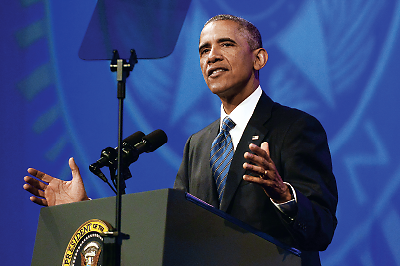President Obama issued 19 executive actions last month to improve mental health care for active-duty military service members, their families, and veterans. APA has been a strong advocate for many items in the president’s plan.
The executive actions, some of which were already under way, were aimed at improving access and quality of care in both the Department of Defense (DoD) and Department of Veterans Affairs (VA) health systems and in smoothing the transition of mental health care as troops move from the DoD to VA systems after retirement or demobilization. The president announced the executive actions at the American Legion’s national meeting in Charlotte, N.C.
“The American Psychiatric Association applauds President Obama’s decision to issue a series of executive orders that will improve access to and quality of mental health services for our nation’s veterans and active-duty service members and focus research efforts on advancing our understanding of PTSD, suicide risk, and traumatic brain injury,” said APA President Paul Summergrad, M.D., in a statement. “The president has addressed many of the issues for which APA has long advocated, and our service members, veterans, and their families will be the beneficiaries. We look forward to working with the DoD and VA as the plans are implemented.”
Among other provisions, the actions will allow changes in the VA’s medication formulary to match DoD’s, ensuring continuity of psychotropic medications without the current need for cumbersome medication waivers.
The DoD will also now automatically enroll service members receiving mental health care in an existing program that moves them from its health system to the VA system. Up to now, that program has required clinician- or self-referral.
The actions will also align the DoD’s TRICARE military health system more closely with civilian mental health parity legislation passed in 2008. Yet another provision will push mental health care options down to the level of operational units. More research on posttraumatic stress disorder, traumatic brain injury, and suicidality are also part of the initiative.
The president’s actions echoed several initiatives supported by the American Legion.
“The 19 executive actions are very good in setting out the things that need to occur,” said the organization’s deputy director for health care, Roscoe Butler, in an interview with Psychiatric News.
“We believe in improving the service member’s transition from the DoD to the VA,” said Butler. That would be helped by completing development of a single medical record for both departments, achieving parity in TRICARE, and expanding use of nonpharmacological treatments for traumatic brain injury and posttraumatic stress disorder, he said.
In his remarks to the American Legion, the president also listed steps that his administration was taking to overcome delays in scheduling appointments and manipulations by some VA employees to hide those delays. Those issues led to the resignations of VA Secretary Eric Shinseki and health system director Robert Petzel, M.D., in May.
“We are going to get to the bottom of these problems,” the president told Legion members. “We’re going to do right by you, and we are going to do right by your families, and that is a solemn pledge and commitment that I’m making to you here.”
More specifically, the VA will expand its mental health awareness and suicide prevention programs. The latter will include requiring Veterans Health Administration clinicians to take online suicide-risk management training every three years. All other staff members who interact with veterans will participate in suicide prevention training every two years.
To familiarize civilian clinicians with the unique aspects of military life, the DoD and VA will distribute a new military cultural competency course to 3,000 community mental health providers. In addition, the Treasury Department and the VA are already seeking to identify communities that might benefit from construction of new mental health facilities for veterans. ■
The White House report on President Obama’s remarks to the American Legion announcing the executive actions can be accessed
here.

